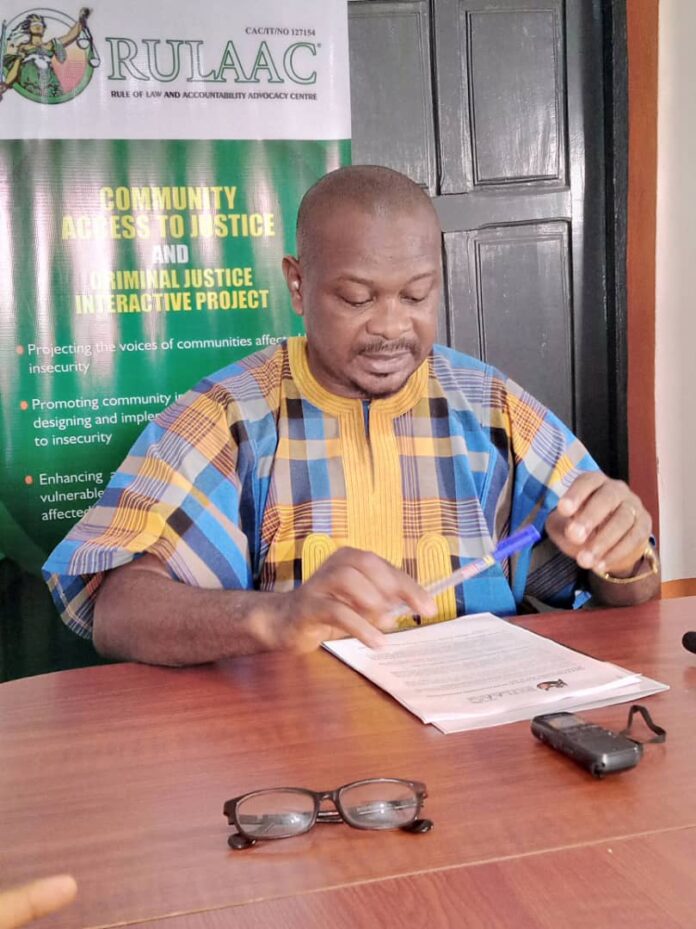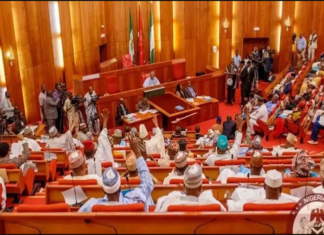Human Rights Day: Police still operate like a Criminal Force, RULAAC laments
The Rule of Law Advocacy and Accountability Centre (RULAAC) has lamented the failure of the Nigeria Police Force in behaving professionally in the observance of citizens’ rights.
RULAAC’s executive director Okechukwu Nwanguma, made the comment during the International Human Rights Day whose theme for this year is Our Rights, Our Future, Right Now.
Nwanguma said the police which ought to protect, enforce and operate in accordance with the law, routinely break the law in the most egregious and reckless manner.
According to Nwanguma, they engage in needless violent approach while carrying out arrests of citizens particularly over civil wrongs. He said the approach blatantly violate the Police Act 2020.
RULAAC’s statement reads in full:
“Today is the international human rights day. The theme for this year is “Our rights, our future, right now”.
“As stated by the UN Secretary General ‘this year’s UN Human Rights campaign focuses on how human rights are a pathway to solutions, as they play a critical role as a preventative, protective and transformative force for good, particularly in times of crises.
“On Human Rights Day, 10 December, UN Human Rights Chief, Volker Türk ‘recalls the simple truth that was enshrined in the Universal Declaration of Human Rights: that human rights impact and concern everyone, everywhere, every day and, because of their centrality in our lives, they should empower individuals, communities, and peoples to build a better future’.
“Unfortunately for us in Nigeria it has been a most troubling time for the observance of human rights by state institutions. In particular the Nigeria Police, the primary law enforcement agency for internal security, remains and continues to operate like a Criminal Force despite years of substantial investments and reform efforts. Of course other agencies like the State Security Service which likes to style itself ‘DSS’ and the EFCC have also been on the prowl abusing and misusing their law enforcement powers, flagrantly violating human rights.
“The police which ought to protect, enforce and operate in accordance with the law instead routinely break the law in the most egregious and reckless manner. The Nigeria Police’ needless violent approach to carrying out arrests of citizens particularly over civil wrongs blatantly violate the Police Act 2020.Their willingness to easily offer themselves as tools for oppression and repression of dissent and freedom of expression and for settling scores is most disgraceful and subversive of the due process and undermine the rule of law on which democracy survives. The trending case of Dele Farotimi is not an isolated case. Across the country, on an almost daily basis, this has been the pattern. Recently, prior to the case of Dele Farotimi, police operatives traveled from Imo State all the way to Abuja and violently and illegally seized Dr. Ihekweme a former commissioner in Imo state under the current hope Uzodinma regime. They manhandled him and took him to Owerri, where he is currently languishing in police detention. His offense is criticizing the government and calling for transparency and accountability in governance. Similarly an Owerri based radio broadcaster Chinonso Uba popularly known as Nonsonkwa Nkwa was, for the second time, also seized by the same Imo State Police Command at the behest of Governor Hope Uzodinma. He has also remained in pretrial custody at Owerri correctional center following his similar abduction style arrest for his critical stance on the performance and governance style of the governor.
“These predatory and irresponsible policing tactics not only violate the due process and human rights of the victims but also further deepen the negative public perception and destroy the legitimacy of the Nigeria Police. Something urgently needs to give to address persistent police violence in Nigeria after EndSARS in October 2020.
“On this occasion of the human rights day 2024, RULAAC calls on the Inspector-General of Police to order an end to the unprofessional, irresponsible, and abusive approaches of the police and to order the immediate release of Dele Farotimi from illegal detention in Ekiti correctional Centre, and Dr. Ihekweme and Nonso Nkwa in Imo State as well as others suffering similar oppression and persecution on account of their exercising their democratic rights to freedom of expression.
“This Press Statement is necessitated by the urgent need to respond to egregious developments with regards to police conduct and practices and the impunity for abuses and corruption. There is the urgent need for efforts to ‘enhance police governance’ and ‘deepen understanding of the Police Act 2020 and Regulations Across Nigeria to address critical gaps in the understanding and application of the Police Act 2020 and accompanying regulations within the Nigerian Police Force (NPF)’.
“The principles of the Police Act 2020 should not only be understood by both the police and citizens but should also be integrated into daily policing practices, thereby promoting a culture of lawfulness and respect for human rights within the NPF.
“Far back in 2006, the Network on Police Reform in Nigeria (NOPRIN), with support from some development partners, conducted extensive research on police abuses throughout Nigeria. I was one of the researchers. That effort sought to shine a light on the pervasive issues of police violence, torture, abuse, and extrajudicial killings by the police, with a view to breaking the cycle of silence and impunity.
The objectives of the research were:
1. Ground law enforcement policy and police reform in the realities faced by the Nigerian populace.
2. Document the patterns and prevalence of police abuses of human rights.
3. Inform the design of policy responses to public safety and security needs.
4. Build an informed constituency for effective and accountable policing.
5. Enable victims of police abuse to seek redress through internal and external oversight mechanisms.
“Independent field monitors were deployed across 14 states over nine months, using a representative sample across Nigeria’s six geopolitical zones. Findings indicated that the actions and operations of the Nigeria Police often contradict Nigerian laws and increasingly endanger the very lives they are meant to protect.
Specifically, the key findings were:
– The Nigeria Police Force increasingly operates as a criminal entity, serving political and financial interests rather than the public.
– Police officers often act with impunity, emboldened by a complete lack of accountability.
– Police are instruments of political repression, used by influential individuals to settle scores and harass perceived adversaries.
– Human rights violations are systematically ignored or poorly investigated, with accountability measures rarely enacted.
Call for Action
“The research culminated in the publication of “Criminal Force: Torture, Abuse, and Extrajudicial Killings by Police in Nigeria,” which called for urgent measures from various stakeholders, including the President, Federal and State Governments, the Police Service Commission, and Nigeria’s international partners.
“Today, 18 years later, there appears to be no major shift from the situation and findings from that research.
“From the ENDSARS protests, to allegations of organ harvesting by some operatives in Anambra, for which the IGP in response to public outrage set up an investigation which remains inconclusive, to a senior police officer’s indictments in the US for fraud and request by the US for his extradition to answer to charges, to recent cases, as outlined above, of police dabbling into civil disputes in contravention of the Police Act and offering themselves as tools for repressing freedom of expression and political dissent and settling personal scores, among other predatory and discreditable behavior, human rights remains in retreat in Nigeria despite our claims to being a democratic society.
Context of Reform
“The Nigeria Police Act, signed into law in September 2020, aimed to transition the police from a colonial and oppressive force to a democratic, community-centered entity. However, the recent ENDSARS protests illustrated the public’s frustration with persistent police violence and impunity.
“Despite the enactment of the Police Act, the subsidiary Police Regulations remain outdated and contradictory, stalling meaningful reform. Stakeholders have put forth efforts to revise these regulations, yet they await gazetting by the Federal Ministry of Justice, further obstructing progress.
“It is imperative for the Ministry of Justice to prioritize the gazetting of the reviewed Police Regulations. This action is crucial for establishing a new legal framework that facilitates substantial police reform, promotes accountability, and enhances public trust in law enforcement. It is time for the government to commit to real change and address the systemic issues within the Nigeria Police Force.”















